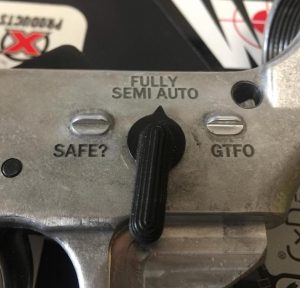So, today is the March for Our Lives, the multi-city Bloomberg-funded gun control march. Here’s my predictions for today and the time following the march. Anyone want to bet on how many are true, or add their own predictions? Comment below!
- Speeches and signs will condemn the NRA, gun owners, and pro-gun-rights politicians, accusing them of being complicit in the murder of innocents. The media will report this without question.
- Accusations will be made that the NRA, gun owners, and pro-gun-rights politicians care more about guns than the lives of children.
- Speeches and signs will accuse the NRA of being in the pocket of the gun industry, while this is demonstrably false. The media will report this without question.
- People will claim that “nobody is going to take your guns” while speeches and signs will call for the banning and confiscation of broad classes of guns or all guns entirely. The media will not comment on this contradiction.
- People will discuss how their “right not to be shot” outweighs the right of people to own guns.
- The media will favorably compare the march to past civil rights protests. Nobody will mention that the proposals the marchers support reduce civil rights.
- All public credit for organizing the march will be given to students, with no acknowledgement of the millions of dollars of funding given by Bloomberg, et al., or the behind-the-scenes planning, organizing, and coordinating done by his gun control groups.
- Anti-gun-rights politicians will join in, to much public fanfare. Few of the marchers will recognize anyone other than Bernie Sanders.
- Marchers and politicians will propose various anti-gun laws that wouldn’t have had any effect at preventing any of the recent mass shootings and they will claim such measures are “common sense”. They will be hailed in the media as heroes, and those who oppose them as being injurious to the rights of millions and ineffective at their stated goal will be vilified as monsters.
- Many people will be quoted as saying “I support the Second Amendment, but…[list of gun control talking points]”
- Claims that “this time something is different” will be made incessantly by the media, by protesters, etc. No (or weak) evidence will presented to back up that claim.
- The protesters will leave behind substantial amounts of waste, garbage, and litter in their wake.
- The vast majority of protesters will return to their homes feeling accomplished but otherwise take no further action; they will continue to vote for the politicians they were going to vote for anyway, maybe send a letter or two to their legislators, but then other things get in the way. Many students will head off to college in the next year or two, making it harder for them to coordinate. Some will be seen in the media for a few months, but ultimately will drop off the radar until the next mass shooting happens, at which point they’ll be trotted out in front of the cameras for their next 15 minutes of fame.
- Some pro-gun-rights groups or individuals will stage laughably small, uncoordinated marches that will not accomplish anything. Some will be holding guns and generally make fools of themselves on the news.
- Ultimately, little will change: some anti-gun-rights states will pass anti-gun-rights laws, some pro-gun-rights states will pass pro-gun-rights laws, maybe some minor things will happen (e.g. bump stock bans), and politicians will make various noises in public about wanting to do something. Regardless of what happens, lawsuits will be filed and pro- and anti-gun-rights groups will send out desperate pleas for money. The inertia of the status quo will prevent major changes.
